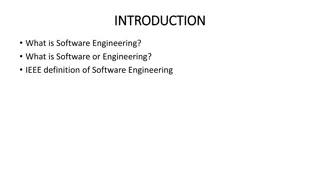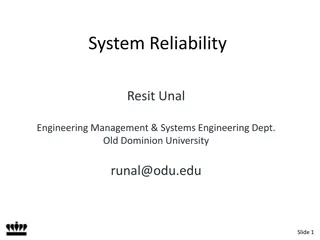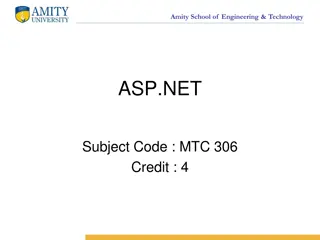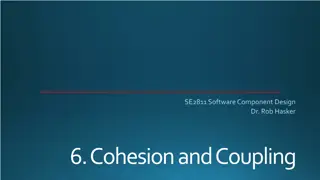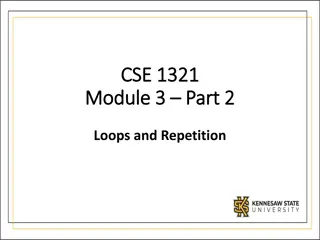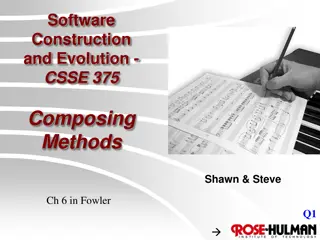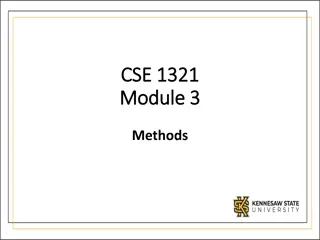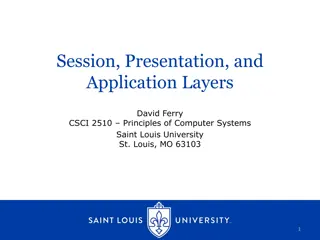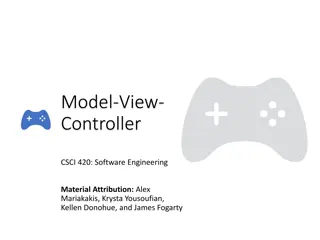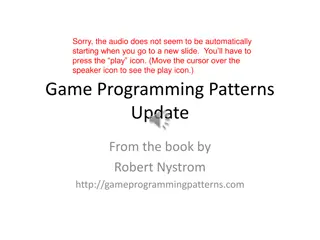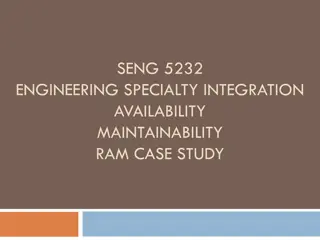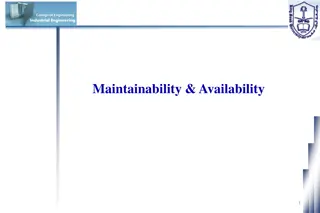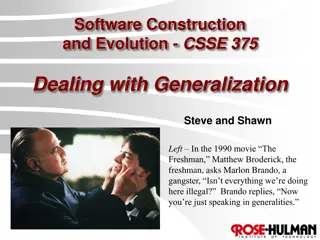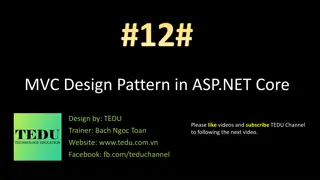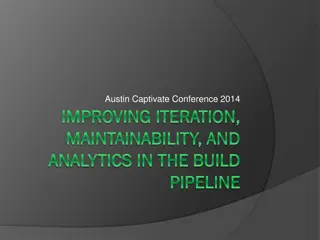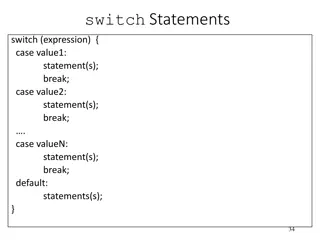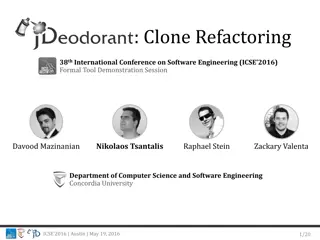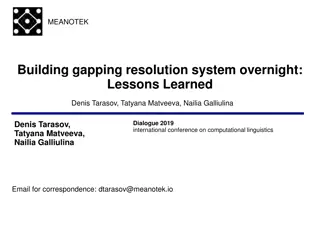Software Engineering: Concepts and Characteristics
Software engineering involves the application of scientific principles and methods to develop efficient, reliable software products. The need for software engineering arises due to factors like large software size, scalability, cost concerns, dynamic nature, and quality management. Good software exh
4 views • 25 slides
System Reliability in Engineering
System Reliability in Science/Engineering involves understanding how products/systems work, as well as the ways they fail and the effects of failures. Reliability is the probability that a system will perform as expected under given conditions and play a crucial role in the design phase to mitigate
0 views • 19 slides
Introduction to ASP.NET at Amity School of Engineering & Technology
ASP.NET is a specification by Microsoft for creating dynamic web applications, websites, and services. It offers benefits like component-based development, event-driven architecture, and extensible architecture. Amity School of Engineering & Technology emphasizes separate visualization from business
0 views • 16 slides
Mastering Idiomatic Python Programming Techniques
Idioms in Python, whether in natural language or programming, are expressions that simplify tasks and enhance code readability and maintainability. Using idioms in coding can also facilitate peer review. While not mandatory, learning idioms through practice, reading good source code, and self-review
2 views • 40 slides
Dependency Injection Principles in Software Development
Explore the concept of Dependency Injection, its importance in decoupling code modules, SOLID principles, and why it's crucial for maintainability, flexibility, and testability in software development.
2 views • 23 slides
Transitioning EPICS Base to Modern C++ for Enhanced Performance
Enhance your EPICS Base system by utilizing modern C++ features such as strict type checking, zero-cost abstraction, templates, and more. Learn the motivations behind switching to C++ and explore the new C++ features for improved efficiency and maintainability.
1 views • 16 slides
Cohesion and Coupling in Software Component Design
This content discusses the concepts of cohesion and coupling in software component design. It covers the importance of having high cohesion and low coupling in software systems to ensure better structure, ease of understanding, and maintainability. It also explores how design patterns such as Adapte
0 views • 30 slides
Knockout JS: A Powerful JavaScript Library for Dynamic UIs
Knockout JS is a JavaScript library developed by Steve Sanderson that facilitates the creation of dynamic and responsive user interfaces. It is based on the MVVM design pattern, which separates the data model, view model, and view to enhance maintainability and reduce errors. The library's observabl
3 views • 20 slides
Loops and Repetition in Programming
Loops in programming allow us to execute a set of statements multiple times based on certain conditions. This content covers the motivation behind using loops, different types of loops like while and for loops, criteria for choosing the right loop, and the syntax and logic of while loops. By underst
0 views • 69 slides
Total Quality Management (TQM) and Dimensions of Quality
Total Quality Management (TQM) is customer-oriented, aiming to achieve customer delight through systematic quality improvements. Quality, defined by experts like Juran and ISO, focuses on fitness for use and meeting customer needs. The concept includes dimensions like Product Quality (Functionality,
0 views • 30 slides
The Importance of Naming in Software Development
Effective naming of variables, functions, and concepts is crucial in software development to enhance readability, maintainability, and communication among team members and stakeholders. This article stresses the significance of thoughtful naming conventions, providing insights into the impact of nam
0 views • 50 slides
Refactoring Methods for Composing Code in Software Construction
Explore the key concepts of refactoring methods for composing code in software development. Learn about techniques such as Extract Method and how they can improve code readability, maintainability, and reusability. Understand the process of creating well-named methods and optimizing code structure f
0 views • 23 slides
The Importance of Functions in Programming
Functions in programming serve as a logical grouping of statements, allowing for reusable chunks of code that can be written once and called multiple times. By using functions, developers can work at a higher level of abstraction, reduce complexity, and minimize the code size. Functions eliminate th
0 views • 40 slides
Modularity and Data Abstraction in Programming
Learn about the importance of procedural abstraction, information hiding, modules, and abstract datatypes in programming. Discover how these concepts help in structuring large programs, improving maintainability, and enhancing data organization and operation control.
0 views • 56 slides
The Layers of Computer Systems Architecture
Explore the intricacies and responsibilities of the Session, Presentation, and Application layers in computer systems architecture. From user identification to data presentation and network programming, delve into the critical functions and challenges faced at each layer. Gain insights into the impo
0 views • 10 slides
Workshop on Maintaining PIP-II within the Accelerator Complex - Operational Requirements and Interfaces
This workshop, held on July 15, 2021, focuses on maintaining the PIP-II within the Accelerator Complex through discussions on uptime, availability, maintainability, and operability requirements. The event covers various presentations on system interfaces, maintenance strategies, and operational expe
0 views • 4 slides
Model-View-Controller (MVC) Pattern in Software Development
The Model-View-Controller (MVC) pattern is a fundamental design pattern used in building data-driven user applications. It separates the application into three interconnected components - the Model (for data representation), the View (for presenting data to users), and the Controller (for handling u
0 views • 30 slides
MVC Pattern in Software Engineering
MVC (Model-View-Controller) is a classic design pattern used in software engineering to manage data-driven user applications. It separates the application into three interconnected components - Model, View, and Controller. Each component has specific tasks to handle, leading to organized code, ease
0 views • 17 slides
Stronger vs. Weaker in Programming Concepts
Exploring the differences between stronger and weaker specifications in programming, along with insights on subtypes, subclasses, typing, generics, and method declarations. Learn how to differentiate, apply, and leverage these key programming concepts effectively to enhance code quality and maintain
0 views • 11 slides
Improving Game Programming Patterns for Better Maintenance
In game development, synchronization with the render cycle is crucial to ensure smooth movement and user experience. The current approach of handling individual entities in the main game loop can lead to a cluttered and difficult-to-maintain codebase. By implementing the Update Pattern, where each e
0 views • 14 slides
Availability and Maintainability in Engineering
Availability and maintainability are crucial aspects in engineering, defining the system's operable state and its ability to fulfill missions. Availability is the probability of the system being operational when called for, contingent on factors such as failure occurrence, maintenance frequency, and
0 views • 74 slides
Industrial Engineering Maintainability & Availability Overview
Industrial engineering maintainability focuses on the built-in characteristics of equipment design to ensure efficient maintenance processes, minimize downtime, and lower maintenance costs. Key measures like Mean Time To Repair (MTTR) and Mean Preventive Maintenance Time (MPMT) are used for analysis
0 views • 16 slides
Dealing with Generalization in Software Construction
Explore methods to address common code smells related to generalization in software development, such as dealing with duplicate code, inappropriate intimacy, and large classes. Learn how to apply techniques like Pull Up Field, Pull Up Method, and Extract Subclass to improve your code structure and m
0 views • 20 slides
Understand MVC Design Pattern in ASP.NET Core
ASP.NET Core web applications follow the MVC design pattern, which emphasizes separation of concerns, with distinct responsibilities for the Model, View, and Controller components. This pattern ensures maintainability, testability, and extensibility of applications. Learn how each component function
0 views • 8 slides
Improving Build Pipeline Speed and Efficiency for Large C/C++ Projects
This discussion focuses on enhancing iteration speed, maintainability, and analytics in the build pipeline for C and C++ projects, addressing common challenges such as slow compilation, inefficient build processes, and tool limitations. Techniques like CSBuild and existing solutions like Incredibuil
0 views • 73 slides
Design Patterns Overview and Application Scenarios
Explore various design patterns such as Creational, Structural, and Behavioral patterns, including Adapter, Decorator, Proxy, and more. Learn how to apply these patterns to solve common software design challenges and improve code flexibility and maintainability.
0 views • 16 slides
Switch Statements in Programming
Switch statements are a powerful feature in programming that allow for efficient branching based on the value of an expression. This content explains the syntax, rules, and usage of switch statements, along with examples and best practices. Learn how to effectively implement switch statements in you
0 views • 15 slides
Enhancing Clone Refactoring Tools for Software Engineering
The formal tool demonstration session at ICSE 2016 presented insights into clone refactoring, highlighting the impacts of clones on software maintenance. The session discussed the harmful aspects of clones, such as error-proneness and increased maintenance costs, as well as the benefits, such as imp
0 views • 23 slides
Software Engineering Fundamentals
Explore the significance of software in modern economies, the attributes of good software, software engineering principles, software processes, and process models. Learn how software engineers ensure functionality, maintainability, dependability, efficiency, and usability in software development.
0 views • 25 slides
MEANOTEK Building Gapping Resolution System Overnight
Explore the journey of Denis Tarasov, Tatyana Matveeva, and Nailia Galliulina in developing a system for gapping resolution in computational linguistics. The goal is to test a rapid NLP model prototyping system for a novel task, driven by the motivation to efficiently build NLP models for various pr
0 views • 16 slides
Insights on Reliability, Availability, Maintainability in Engineering
Explore key concepts from Wasson's chapter on Reliability, Availability, and Maintainability, including compensating provisions and latent defects. Get ready for an introduction to reliability and stay tuned for strategies to manage design for R-A-M. Don't forget to study the Bathtub Curve!
0 views • 4 slides
Customized Checkers and Large Scale Refactoring
Dive into the world of Clang-tidy and its application for custom checkers creation and large-scale refactoring. Uncover powerful techniques, tips, and practices for enhancing code quality and maintainability. Explore how Vince Bridgers' insights can streamline your development process and elevate yo
0 views • 35 slides
Chapter 13: Dependability Engineering Lecture 1
This lecture delves into the principles and practices of dependability engineering, emphasizing the importance of reliability, availability, maintainability, and safety in various systems and applications. Topics covered include fault tolerance, error detection, and mitigation strategies to ensure c
0 views • 50 slides
Introducing Mixins: Enhancing CSS Migration with Preprocessors
In the realm of web development, CSS migration can be streamlined through the introduction of mixins in preprocessor languages like SASS or LESS. Mixins serve as a bridge to address shortcomings in traditional CSS, enabling code reuse and enhancing the overall efficiency of stylesheet management. Th
0 views • 37 slides
Management
Software maintenance impacts various aspects of user satisfaction, from digital platforms to physical infrastructures like Indiana roads. This session delves into key topics such as maintenance goals, organizational options, critical issues, and best practices for enhancing maintainability. The cont
5 views • 22 slides
Week 5 -Monday
Scala is a versatile programming language that emphasizes reducing coupling within code and writing in a modular style. The importance of placing code into packages and managing dependencies is highlighted, showcasing how Scala handles structures like unnamed packages and multiple packages. The disc
0 views • 34 slides
Reasons to study Data Structures & Algorithms
Data structures and algorithms provide essential tools for programmers to abstractly manage real-world data, enhance coding readability, understandability, and maintainability. By mastering these concepts, programmers can improve their problem-solving skills and overall programming efficiency. Consi
0 views • 15 slides
Microservices Design
In microservices design, adopting high cohesion and autonomous approach is crucial. High cohesion emphasizes identifying a single focus in business functions and splitting them into finer-grained services to achieve better organization and maintainability. On the other hand, the autonomous approach
0 views • 25 slides
Function Prototype
Large programs are best developed and maintained by dividing them into smaller modules through the technique called "Divide and Conquer." This approach enhances code organization, reusability, and maintainability. Learn about function prototypes, definitions, calling, and examples to effectively imp
0 views • 30 slides
